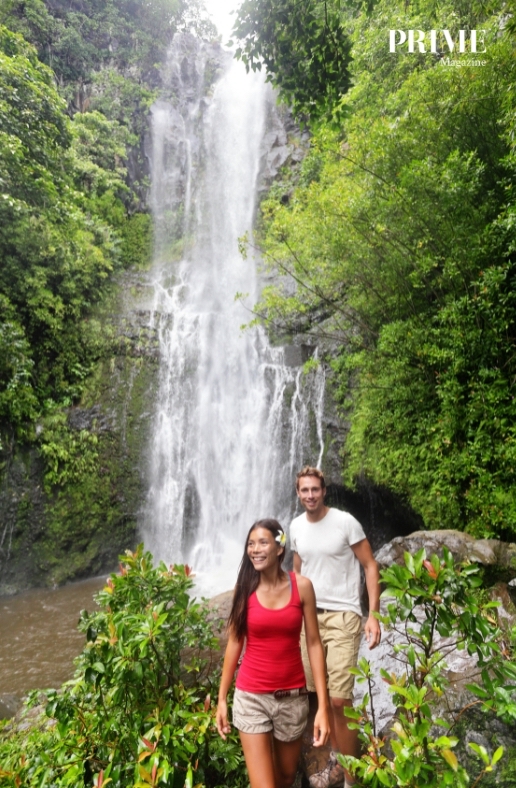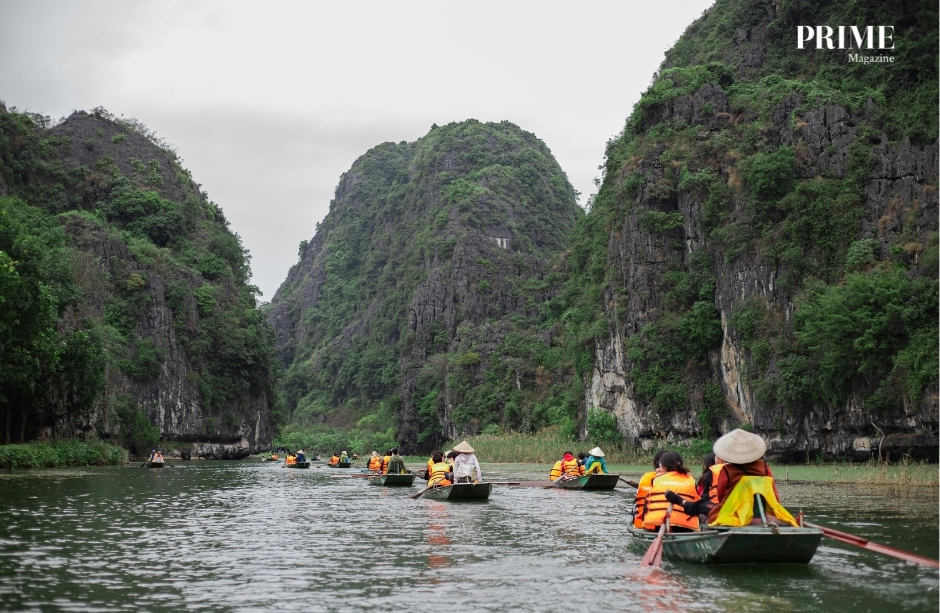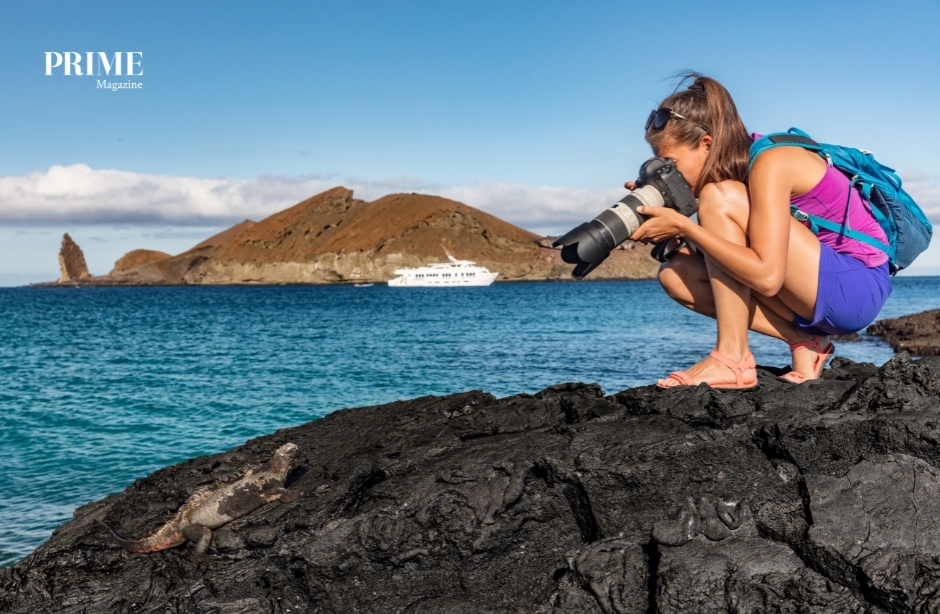
Travel essentials – passport, money, pen, compass, usb, earpiece
(Article 1 of the Prime.sg Ecotourism Series)
Travel has changed in many ways over the past decade, and more people are beginning to ask why ecotourism matters in today’s world. Many travellers now seek meaningful experiences that respect nature and local communities. They want holidays that feel enriching, not rushed; sustainable, not wasteful. As concerns about climate change grow, understanding why ecotourism matters has become increasingly important for anyone who wants to explore the world responsibly.
Why Ecotourism Matters Today: A Growing Travel Movement

Hawaii Tourists Hiking by Waterfall
Ecotourism is now one of the fastest-growing sectors in global travel. Before the pandemic, the industry generated more than US$180 billion in revenue. Despite worldwide travel restrictions, it still grew to US$185.87 billion in 2021. The latest forecasts show an annual growth rate of more than 15% until 2030.
This rising interest reflects a desire to reconnect with nature. In busy, built-up cities, green spaces are limited. People want fresh air, quiet forests, clean ocean water and wildlife encounters. These reasons clearly show why ecotourism matters for modern travellers. It reconnects them to experiences that feel grounding and renewing.
The growing awareness of climate issues also plays a role. Reports of coral bleaching, deforestation, melting ice and threatened species appear regularly in the news. As people understand these issues better, they become more careful about how their holidays impact the environment. This shift is one reason why ecotourism matters: it allows people to explore the world while helping protect it.
How Traditional Tourism Affects the Environment

Couple tourists
Large-scale tourism, when unmanaged, can harm the very places people come to admire. Overcrowding at natural and cultural sites often strains local resources. Popular beaches may face water pollution. Too many visitors on a hiking trail can cause soil erosion. Resorts built too close to marine habitats can disturb coral reefs and sea life.
Culture can also suffer. When tourism grows too quickly, communities may feel pressured to change their traditions to meet tourist expectations. Local residents may be priced out of their neighbourhoods, and family-run businesses may struggle to compete with new, large establishments.
These problems highlight why ecotourism matters so deeply. Sustainable travel helps ensure that natural areas and cultural traditions are preserved instead of damaged.
What Ecotourism Really Means — and Why It Matters

People in Boats in Ninh Binh, Vietnam
The International Ecotourism Society defines ecotourism as “responsible travel to natural areas that conserves the environment, sustains the well-being of local people, and involves interpretation and education.”
This definition explains why ecotourism matters through three key principles:
1. Responsible Travel
Travellers follow rules designed to protect the environment. This includes staying on marked trails, avoiding wildlife disturbance and respecting all park guidelines.
2. Environmental Conservation
Many eco-destinations reinvest part of their visitor fees into conservation. These efforts support forest protection, wildlife monitoring, coral restoration and scientific research.
3. Community Well-Being
Ecotourism provides fair employment to local guides, boat operators, homestays and small businesses. It helps communities maintain their cultural identity and supports education and livelihood programs.
When these principles work together, they show clearly why ecotourism matters: it benefits people, wildlife and nature at the same time.
Why Ecotourism Matters for Travellers Too
Sustainable travel is not only good for the planet—it enriches the traveller’s experience.
Closer Encounters With Nature
Ecotourism often brings travellers into national parks, rainforests, caves, mountains or marine reserves. Seeing wildlife in their natural habitats creates a deeper sense of wonder than viewing animals in captivity.
Guided Learning and Interpretation
Most ecotours include well-trained guides who explain the significance of each habitat, species and local tradition. This educational experience helps travellers understand why ecotourism matters and how their actions make a difference.
Wellness and Connection
Nature exposure reduces stress and improves well-being. Many travellers find that eco-friendly trips feel slower, calmer and more meaningful than fast-paced package tours.
How to Choose Responsible Ecotourism Providers

Woman taking a photo on the beach
Not all tours labelled “eco-friendly” are genuinely sustainable. Choosing the right provider ensures your trip makes a positive impact.
Look for:
-
Eco-certifications from trusted bodies such as GSTC
-
Local hiring and fair wages
-
Small group sizes
-
Respectful wildlife guidelines
-
Transparent conservation support
-
Positive reviews from eco-minded travellers
Selecting responsible providers supports authentic ecotourism and reinforces why ecotourism matters as a long-term travel movement.
Starting Your Ecotourism Journey
Starting with simple practices can make your travels more sustainable:
-
Visit national parks
-
Join guided nature walks
-
Stay at eco-certified lodges
-
Travel during off-peak seasons
-
Support local artisans and food businesses
-
Reduce waste during trips
These small steps strengthen the impact of ecotourism and help travellers practise why ecotourism matters through action, not just intention.
What’s Next in Our “Why Ecotourism Matters” Series
This article launches a six-part ecotourism series exploring some of the world’s most remarkable eco-friendly destinations. Each location highlights different ecosystems, cultures and conservation successes.

Galápagos Islands, Ecuador
Coming up next:
Each article will explain what makes the destination special, how to travel responsibly and the best times to visit.
Conclusion
Understanding why ecotourism matters helps travellers make informed, responsible choices. Ecotourism protects natural habitats, supports communities, and gives visitors experiences that are meaningful and memorable. As you follow this series, we invite you to discover extraordinary places where nature, culture and sustainability come together beautifully. PRIME
This article is Part 1 of the “Nature Calls: Ecotourism Around the World” series. Stay tuned for Part 2: The Galápagos Islands.













Leave A Comment